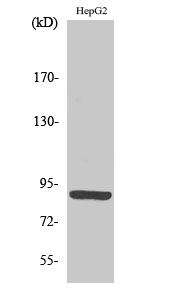M-cadherin Polyclonal Antibody
- Catalog No.:YT2677
- Applications:WB;IHC;IF;ELISA
- Reactivity:Human;Mouse;Rat
- Target:
- M-cadherin
- Fields:
- >>Cell adhesion molecules
- Gene Name:
- CDH15
- Protein Name:
- Cadherin-15
- Human Gene Id:
- 1013
- Human Swiss Prot No:
- P55291
- Mouse Gene Id:
- 12555
- Mouse Swiss Prot No:
- P33146
- Immunogen:
- The antiserum was produced against synthesized peptide derived from human CDH15. AA range:81-130
- Specificity:
- M-cadherin Polyclonal Antibody detects endogenous levels of M-cadherin protein.
- Formulation:
- Liquid in PBS containing 50% glycerol, 0.5% BSA and 0.02% sodium azide.
- Source:
- Polyclonal, Rabbit,IgG
- Dilution:
- WB 1:500 - 1:2000. IHC 1:100 - 1:300. ELISA: 1:10000.. IF 1:50-200
- Purification:
- The antibody was affinity-purified from rabbit antiserum by affinity-chromatography using epitope-specific immunogen.
- Concentration:
- 1 mg/ml
- Storage Stability:
- -15°C to -25°C/1 year(Do not lower than -25°C)
- Other Name:
- CDH15;CDH14;CDH3;Cadherin-15;Cadherin-14;Muscle cadherin;M-cadherin
- Observed Band(KD):
- 89kD
- Background:
- This gene is a member of the cadherin superfamily of genes, encoding calcium-dependent intercellular adhesion glycoproteins. Cadherins consist of an extracellular domain containing 5 cadherin domains, a transmembrane region, and a conserved cytoplasmic domain. Transcripts from this particular cadherin are expressed in myoblasts and upregulated in myotubule-forming cells. The protein is thought to be essential for the control of morphogenetic processes, specifically myogenesis, and may provide a trigger for terminal muscle cell differentiation. [provided by RefSeq, Jul 2008],
- Function:
- disease:A chromosomal aberration involving CDH15 and KIRREL3 is found in a patient with severe mental retardation and dysmorphic facial features. Translocation t(11;16)(q24.2;q24).,disease:Defects in CDH15 are the cause of mental retardation autosomal dominant type 3 (MRD3) [MIM:612580]. Mental retardation is characterized by significantly sub-average general intellectual functioning associated with impairments in adaptative behavior and manifested during the developmental period.,function:Cadherins are calcium dependent cell adhesion proteins. They preferentially interact with themselves in a homophilic manner in connecting cells; cadherins may thus contribute to the sorting of heterogeneous cell types. M-cadherin is part of the myogenic program and may provide a trigger for terminal muscle differentiation.,similarity:Contains 5 cadherin domains.,tissue specificity:Expressed in the brai
- Subcellular Location:
- Cell membrane; Single-pass type I membrane protein.
- Expression:
- Expressed in the brain and cerebellum.
- June 19-2018
- WESTERN IMMUNOBLOTTING PROTOCOL
- June 19-2018
- IMMUNOHISTOCHEMISTRY-PARAFFIN PROTOCOL
- June 19-2018
- IMMUNOFLUORESCENCE PROTOCOL
- September 08-2020
- FLOW-CYTOMEYRT-PROTOCOL
- May 20-2022
- Cell-Based ELISA│解您多样本WB检测之困扰
- July 13-2018
- CELL-BASED-ELISA-PROTOCOL-FOR-ACETYL-PROTEIN
- July 13-2018
- CELL-BASED-ELISA-PROTOCOL-FOR-PHOSPHO-PROTEIN
- July 13-2018
- Antibody-FAQs
- Products Images

- Western Blot analysis of various cells using M-cadherin Polyclonal Antibody diluted at 1:500

- Western blot analysis of lysates from HepG2 and 293 cells, using CDH15 Antibody. The lane on the right is blocked with the synthesized peptide.



